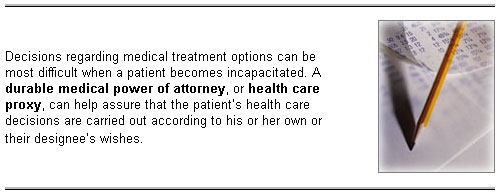|
|

|
|
|
 |
 |
|
|
|
|
|
Family
"Values": Protecting Your Loved Ones


Unfortunately, life may
sometimes bring with it an unexpected
twist. Because many families today depend
on two incomes to maintain a standard
of living, the tragic death of a spouse
can dramatically change everything. Even
with single-income families, the at-home
spouse may provide incalculable "non-cash"
services such as maintaining the home
and rearing the children. If one income
suddenly stops, or you are forced to begin
paying for services that once were "free,"
the impact on your family`s finances and
lifestyle could be devastating.
This is where life insurance can
be of great value. Adequate insurance
can help replace the income of a spouse
or provide additional income so your children
will be adequately cared for and family
life will continue to run on course.
To underscore the point, look at the income
in real dollars if both you and your spouse
work. What would the extent of that lost
income cost your family? The other side
of the problem is how much cash would
it take to replace all that the "non-working"
spouse contributes to your family?
Things become even more complicated if
you have a child with special needs. If
your non-working spouse is providing care
for that child, who will handle those
duties in the event of your spouse`s death?
Insurance may help ensure the child continues
receiving the proper care.

|
|
|
|
Customizing
Life Insurance with Policy Riders

|
When most people think of life
insurance, the first thing that
usually comes to mind is, "How much
do I need?" However, there are other
aspects of life insurance policies
that are worth considering and that
can provide important benefits.
For example, riders essentially
allow policy owners to give themselves
and their beneficiaries added protection
if certain events happen. Among
the large number of riders that
life insurance companies offer,
one of the more frequently utilized
is the "waiver of premium."
|
|
The waiver of premium
rider protects you in the event that
you are disabled and can no longer afford
to pay your life insurance premiums. This
rider has been compared to having a miniature
disability income policy on your life
insurance contract. Not only does the
insurance company pay your premiums pursuant
to the terms of the contract, but if you
own a whole life policy, the policy cash
values and dividends generally continue
to grow. These increasing policy values
can be a ready source of income that you
can use to help pay your expenses if you
are disabled and can no longer work. You
could access these values through loans
or surrenders. (Note that loans and withdrawals
may result in adverse tax consequences
and loans carry interest. Cash values
and death benefits may be affected, too.)
Eligibility Requirements
Like a life insurance applicant's
insurability, the availability of the
waiver of premium rider may also be based
on certain risk factors, such as general
health and past medical history. In addition,
once issued, most policies contain important
eligibility requirements before the waiver
of premium rider will take effect. Policies
generally contain a specific waiting period
(e.g., six months) before premiums begin
to be paid under the rider. Some policies
apply waiver of premium coverage differently
for a disability occurring prior to age
60, compared to one occurring between
the ages of 60 and 65. Under many policies,
the waiver of premium provision terminates
at age 65.
While the waiver of premium
rider on term and whole life policies
will generally waive the entire premium,
the waiver may work a little differently
on other types of policies, separating
the premium waiver for the cost of insurance
from that associated with the cash value
or investment fund.
The definition of "disability" in your
policy is also crucial, because it determines
when your obligation to pay premiums ends.
The key is usually whether you are "totally
disabled" under your policy's definition.
While some policies consider you totally
disabled when an illness or injury leaves
you unfit for the type of work that you
have always done, other policies may contain
a clause that states you must be unfit
for any type of work.
Policy riders tend to take a "back seat"
when planning insurance needs, because
so much of the initial focus is on how
much coverage is necessary to provide
adequate protection. However, part of
the process of determining adequate protection
should also involve taking advantage of
the opportunities to customize your life
insurance policy so it fully meets your
needs.
|
|
|
|
Consider
Inflation When Developing Your Insurance
Plan


Because inflation affects
our future purchasing power, it also affects
our future life insurance needs. For families
like the Bartons, inflation means that
what may have been adequate life insurance
coverage several years ago, may no longer
be sufficient. With this in mind, let`s
take a quick look at three of the more
common life insurance needs that are often
affected by inflation.
Purchasing a new home with a mortgage.
Until recently, it seemed that once you
bought a house, you stayed in it forever.
Times have certainly changed. Today, Americans
are mobile. Increasing employment opportunities
and dual incomes have changed the dynamics
of family finances. In many cases, a growing
family can now afford paying a mortgage
on a lot more "house" than at anytime
in the past. Does this trend minimize
the reality of inflation and the rising
costs of homeownership? Not at all. The
fact is, escalating real estate prices
have translated into larger mortgage loans.
Therefore, if you`ve recently purchased
a home, consider increasing your life
insurance to cover your new mortgage.
College education costs.
If you`re planning on sending your children
to college, you`re probably concerned
about the rising costs of higher education-and,
rightfully so! The average annual cost
for attending a four-year, private college
has doubled over the last twenty years!
To combat rising college costs, factor
inflation into your college savings plan.
In addition, make sure you have a contingency
plan in place-that is, adequate life insurance
protection in the event of an untimely
death. As you evaluate your education
savings plan, consider increasing your
life insurance coverage so that it best
reflects the future cost of education.
Everyday expenses.
Shopping at the grocery store. . .pizza
on Friday nights. . . taking your children
to the movies. . .filling up your gas
tank. . . replacing the roof on your house.
Over the course of time, the costs associated
with these necessities and "treats" of
everyday life are greatly impacted by
inflation. As a result, your family`s
future lifestyle could be affected, too.
By basing your life insurance needs on
your current income and today`s cost of
goods and services, you are potentially
shortchanging your family`s future. Be
sure to include inflation in your life
insurance plan to help maintain your family`s
current lifestyle.

|
|
|
|
A
Medical Power of Attorney Can Protect
Your Health Care Rights


WA Living Will is not
Enough
Several cases that made
the news in the past, have highlighted
the family trauma, confusion, and expense
that arise due to a failure to provide
complete instructions regarding medical
treatment. A living will, which an individual
draws up to outline his or her health
care preferences in advance (in the event
he or she becomes incapable of making
and communicating decisions), may not
anticipate the broad range of situations
and conditions where decisions will need
to be made. A living will typically does
not appoint a specific decision maker
to fill this void.
An alternative to living wills is to assign
authority for medical decision-making
to a specific person in a ďdurable medical
power of attorney.Ē The typical power
of attorney document does not provide
for medical decision-making authority,
thus there is a necessity for separate
designations.
Benefits of a Durable Medical Power
of Attorney
In essence, the durable
medical provision allows you to specify,
in advance, the person you want to make
critical decisions regarding your health
care and well-being, should you become
incapable of making and communicating
these decisions for yourself. This option
is particularly useful for elderly people
who may fear cognitive impairments in
the closing stages of life; people with
debilitating or degenerative diseases;
or people facing medical treatment that
might render them temporarily or permanently
incapacitated.
Without a named durable medical power
of attorney, frontline health care providers-
such as nursing home administrators, some
health agencies, and hospital social service
departments- may be unclear or conflicted
about what the appropriate level of health
care is for a particular patient. In many
cases, these decisions, such as whether
or not to resuscitate a terminally ill
patient, are made in a crisis or emergency
mode. The absence of a named durable medical
power of attorney can result in an inappropriate
conservatorship or guardianship that could
frustrate the patientís family and that
might not meet the patientís wishes.
The durable medical power of attorney
provides protection through a legal document
(as does a health care proxy) that allows
a person to designate an ďagentĒ to make
informed choices about health care matters
based on, and with respect to, the personís
life view and religious, as well as philosophical,
beliefs. This document often complements
a financial power of attorney and a revocable
trust providing complete coverage for
all planning needs in the event of incapacity.

|
|
|
|
Disability
Income Insurance- Policy Considerations

|
Imagine what would happen if your
ability to earn income were to suddenly
disappear. What would your life
be like? Even though your income
had abruptly stopped, your living
expenses would continue. The mortgage
and car payments would be due- missing
several payments could result in
foreclosure or repossession. You
and your family would still have
to eat, use electricity, heat your
home, etc. How would you cope?
The best way to protect yourself
from the financial harm that a disability
can cause may be to purchase
disability income insurance.
Disability income insurance is designed
to replace lost income in the event
that a disabling illness or injury
prevents you from working. It makes
an enormous difference at a time
when you should be focused on your
health and recovery- not on how
your bills are going to be paid.
|
|
Key Policy Features
When selecting an individual disability
income policy, the following are important
coverage areas to check:
|
|
Definition of disability Policy
definitions can vary. Does the policy
define disability as the inability
to perform your own job or any job?
Select a policy that will pay benefits
when you are unable to work in your
occupation or one appropriate for
your education and experience
|
|
|
Extent of coverage Are benefits
available for total or for partial
disability? Are full benefits paid
for loss of sight, speech, hearing,
or use of limbs whether or not you
are able to work? Does the policy
cover both accidents and illness?
|
|
|
Amount of monthly benefit
What percentage of income will the
benefit replace? Most insurers limit
benefits from all sources to 70%
or 80% of net monthly income.
|
|
|
Waiting period Will benefits
begin 30, 60, or 90 days, or even
six months, after the onset of the
disability? The longer the waiting
period, the lower your premiums
will be.
|
|
|
Duration of benefits Are
benefits payable for one, two, or
five years, to age 65, or for a
lifetime? Most people need a benefit
period that covers their working
years, at least to age 65 or normal
retirement age.
|
|
|
Inflation rider Does the
policy offer a cost-of-living adjustment?
This important rider should always
be considered, for as the cost of
living continuously increases you
will want your benefit to keep pace
with inflation
|
|
|
Renewability Is the policy
noncancelable, guaranteed renewable,
or conditionally renewable? A noncancelable
policy will continue in force at
the same premiums and benefits,
as long as you pay timely premiums;
a guaranteed renewable policy will
be automatically renewed for an
entire class of policyholders, but
the premiums may be increased; optionally
or conditionally renewable policies
are extended each anniversary or
premium due date if the company
decides to do so.
|
|
|
Waiver of premiums How long
must you be disabled before premiums
are waived? Under most policies,
you wonít have to pay any more premiums
after you have been disabled for
90 days.
|
|
|
Option to buy more coverage
Can coverage be increased without
further evidence of insurability?
|
For more help with your
disability insurance planning, analyze
your sources of disability income and
determine whether additional insurance
coverage is advisable.
|
|
|
|
Life
Insurance: Changing Times, Changing Needs

|
When Kim Harrison purchased her
life insurance policy ten years
ago, she assumed her life insurance
planning was complete. She figured
that if she just paid her premiums
on time, she could sit back and
not think about life insurance anymore.
True, Kim's policy has provided
her with comfort of knowing by helping
to protect her family. However,
that doesn't mean she should let
her insurance policy run on autopilot.
Life insurance is just like any
other piece of your financial puzzle.
It should be periodically monitored
as your circumstances and needs
change. This way, you can help ensure
that your life insurance is achieving
its desired objective.
|
|
Here's a closer look at some of the things
that Kim, like all policyholders, should
review at least annually.
Is Your Coverage Up-to-Date?
Kim must first determine if her original
reasons for purchasing her policy are
still current. She should also evaluate
whether or not she's developed any additional
needs. For instance, when Kim initially
purchased her policy, she was newly married
and owned a small, modest home. Now, Kim
and her husband, Jack, have three children
and a much larger home. Is Kim's existing
policy appropriate for these new responsibilities-covering
a substantial mortgage, funding college
for three, and contributing to the protection
of her family's financial security? More
than likely, Kim may require additional
life insurance.
If Kim's existing policy is term insurance,
she may want to consider converting it
to a permanent contract. Permanent insurance
contains a cash value component that offers
the potential for tax-deferred accumulation,
as well as the same death benefit features
of term insurance. In later years, the
cash value could come in handy to help
supplement retirement income needs. Keep
in mind that withdrawals and loans taken
against a policy's cash value could affect
the death benefit and may have tax consequences.
Beneficiaries May Change, Too
As it stands now, the primary beneficiary
of Kim's life insurance policy is her
husband, Jack. If Jack were to predecease
Kim, the policy currently names Kim's
nephew as a contingent beneficiary. Now
that Kim has her own family, she will
likely want to update her policy's beneficiary
arrangement to name her children as contingent
beneficiaries in place of her nephew.
In addition, if Kim and Jack eventually
set up a living trust, their legal advisor
may suggest naming their trust as the
policy's beneficiary.
Planning for Your Growing Estate
Regardless of the type of life insurance
Kim owns and who is named as the beneficiary,
the death benefit proceeds from the policy
will be included in Kim's estate. It's
important that Kim and Jack recognize
this. As their asset base increases over
the years, they should plan accordingly
to reduce the effects of estate taxation.
 |
Life insurance can help play a
significant role in solidifying
the family finances of couples like
the Harrisons. However, it is also
important to recognize that, like
all financial matters, life insurance
policies need to be reviewed on
a regular basis with a qualified
professional. A qualified insurance
professional can be a valuable resource
when it comes to evaluating your
present situation and determining
an appropriate course of action.
|
Copyright 2004 Liberty Publishing, Inc.
All rights reserved. INLREV03
|
|
|
|
Life
Insurance: Maximum Safety from Creditors

|
Life insurance is purchased to
protect people against a variety
of financial situations. In fact,
if a breadwinner dies insolvent,
in many instances the proceeds of
a life insurance policy are all
the surviving family members may
be able to depend on. An important
aspect of life insurance is the
exemption by law in every state
of some portion of cash values and
death benefits from the claims of
the policyowner`s creditors. This
protection given to life insurance
comes from recognition long ago
by state legislators of the special
role life insurance plays in protecting
the family unit.
|
|
State exemption laws may differ in some
respects. However, there are several general
points which can be made. The first is
identification of transactions which do
not receive protection.
If the life insurance proceeds are paid
to the policyowner`s estate, rather than
to a named beneficiary, the general rule
treats proceeds as property, subjecting
them to the claims of the deceased policyowner`s
creditors, just as any property would
be. Additionally, if a policy is assigned
to a lender to collateralize a promise
to repay, the general rule is that the
lender`s security interest in the policy
overrides the general state law exemption.
Finally, as might be expected, the IRS
can reach a policy`s cash values by putting
a tax lien on the policy. In some cases,
the IRS can even reach the policy`s death
benefits.
The next area to examine is how much is
protected by state law. On this point,
the states take a variety of positions.
When it comes to exempting cash values,
some states take the position that cash
values are exempt to a specified dollar
amount. Other states appear to exempt
cash values to a virtually unlimited degree.
Death benefits are dealt with in their
own right, with the majority of states
fully protecting the death proceeds of
life insurance from the claims of the
policyowner`s creditors (other than the
IRS). Some states even protect the death
proceeds from the claims of the beneficiary`s
creditors. In fact, these states not only
protect life insurance, but also protect
endowment and annuity contracts.
 |
During uncertain, personal economic
times, when cash flow problems are
common, many individuals come to
appreciate firsthand how exemption
laws can shield their life insurance
policy`s cash value from creditors.
Knowing how your state defines the
exemption laws will show you, and
may very well solidify, how the
policy you purchased may protect
you from financial situations you
never considered possible.
|
Copyright 2004 Liberty Publishing, Inc.
All rights reserved. INLD105
|
|
|
|
Taking
a Look at Transfer for Value

|
Where insurance policies are concerned,
business owners and their financial
professionals understand that the
proceeds of life insurance policies
are generally received income tax-free.
Surprisingly, there is a part of
the Internal Revenue Code which
provides that under certain circumstances
income taxes may be paid by beneficiaries
on the proceeds of life insurance.
This may occur when policies are
"transferred" incorrectly.
|
|
A transfer occurs when a
policy owner changes the ownership, assigns
an interest in the policy or makes a change
of beneficiary to an existing policy.
A transfer for value occurs when such
interest in a policy is exchanged for
valuable consideration such as money,
property or reciprocal promises.
Transfers for valuable consideration may
trigger income tax on the proceeds of
the policy. However, there are exceptions,
and not all transfers are considered "for
value," in which case there are no adverse
income tax consequences. To qualify for
income tax-free proceeds, the real challenge
is to ensure policy ownership is properly
designed and if policies are transferred,
they are transferred to the proper recipient.
While there are certain life insurance
policy transfers which can clearly avoid
the "transfer for value rule," others
may squarely put policy owners in a position
where, upon the death of the insured,
the life insurance proceeds will be taxable.
Therefore, a business must take great
care to assure that a policy which has
previously been sold or otherwise transferred
for a valuable consideration follows the
specific guidelines (IRC Sec. 101(a)(2)).

One of the main concerns
of both business owners and professionals
is navigating the different rules for
making transfers so that the proceeds
of those life insurance policies do not
trigger income taxable events. Here are
three basic guidelines:
|
|
When the sale or other transfer
for value of an existing life insurance
policy is to the insured (IRC Sec.
101(a)(2)(B)).
|
|
|
When the sale or other transfer
for value of an existing life insurance
policy is to a partner of the insured,
to a partnership in which the insured
is a partner, or to a corporation
in which the insured is an officer
or shareholder (IRC Sec. 101(a)(2)(B)).
|
|
|
A transfer where the transferee`s
basis is determined in whole or
in part by reference to the transferor`s
basis (IRC Sec. 101(a)(2)(A)).
|
For a variety of reasons,
an officer or shareholder of a corporation
might wish to transfer an existing life
insurance policy to the corporation. In
this particular situation, there may be
a distinct advantage. IRC Sec. 101(a)(2)(B)
states that the transfer for value rule
does not apply if the transfer is "to
a corporation in which the insured is
a shareholder or officer." In addition,
if a policy is transferred more than once,
and the last transfer is to a corporation
in which the insured is an officer or
shareholder, the proceeds will be wholly
income tax-exempt regardless of any previous
sale or other transfer for value (Reg.
Sec. 1.101-1(b)(3)(ii)).
However, note that many professionals
doubt whether holding a few shares of
stock actually provides protection as
a result of being "a shareholder." There
is also doubt as to whether a person who
is only nominally an officer with no authority
or duties within the corporation should
actually be considered an "officer" (Rev.
Rul. 80-314, 1980-2 CB152).
Often, a case study helps to address some
of the more common questions which business
owners and consultants routinely ask.
Let`s assume that North Country Aerospace,
Inc., had a cross-purchase plan between
individual stockholders Adams and Barker,
and decides to switch to a stock redemption
plan . In this instance, Adams and
Barker, as stockholders, will be transferring
their policies on each other to North
Country Aerospace, Inc. This transfer
qualifies as one of the exceptions to
the transfer for value rule because the
insureds are shareholders of the corporation.
But now consider this example: North Country
Aerospace, Inc., decides to change its
insurance-funded stock redemption plan
to a cross-purchase plan. North Country
Aerospace, Inc., then sells a policy on
stockholder Adams to stockholder Barker.
Upon that event, the proceeds at death
will lose their income tax-exempt status.
Even if North Country Aerospace does not
sell the policies but merely distributes
them to Adams and Barker, there is a transfer
for value. The valuable consideration
here is the reciprocal promise between
Adams and Barker to fulfill the cross-purchase
plan.
However, a transfer by North Country Aerospace,
Inc., to a shareholder would be ruled
within the "exceptions" if stockholders
Adams and Barker were also partners in
a bona fide (although unrelated) partnership
(IRC Sec. 101(a)(2)(b); PLR 9347016; PLR
9045004).
 |
A final important consideration
is that the Internal Revenue Service
may closely scrutinize a partnership
that has been established or created
solely for the purpose of holding
life insurance policies to avoid
the transfer for value problem.
It is therefore advisable to plan
in what manner life insurance policies
will be held, issued, and transferred
before actually executing the transfer.
|
Copyright 2004 Liberty Publishing,
Inc. All rights reserved
|
|
|
|
Term
Insurance: One Step Beyond

|
Term insurance is typically purchased
to protect a growing family from
the catastrophic loss of a "bread
winner." Lower initial premiums
offer the flexibility to fit immediate
needs. However, over time, a more
permanent and valuable life insurance
contract may be needed to provide
security and more stable premium
payments for the future.
|
|
The low cost/high benefit
of term insurance is its most attractive
feature. However, term insurance premiums
typically continue to rise with age. Some
term contracts do offer premiums that
remain level for a pre-determined number
of years, but these contracts may experience
significant premium increases in the future,
or death benefits that decrease yearly.
A policy that has long-term value and
benefits, and the flexibility to help
cope with change, is important. Therefore,
converting a term policy to a cash value
contract may make sense.
Long-Term Benefits
A quality, cash value insurance policy
provides the same death benefit protection
as term insurance, while offering the
opportunity for tax-deferred cash accumulation.
Unlike term insurance premiums that increase
with age, cash value insurance provides
level premiums for the duration of the
contract (although you must check with
your insurer regarding premium payments
over the life of any given policy).
Although cash value insurance initially
costs more than term, the long-term savings
could be quite substantial. The cash value
build up will continue to grow on a tax-deferred
basis as long as the policy remains in
force. By offering the flexibility to
meet future needs and budgets, a cash
value policy can help provide an excellent
source of funding for retirement income,
college expenses, or other financial needs.
The conversion privilege available in
most term policies offers those who cannot
initially afford cash value insurance
a great opportunity to convert to a cash
value contract at a later date. Some term
policies may offer a conversion credit
that makes converting to cash value insurance
even more economical.
One particular advantage of converting
from term-rather than purchasing a new
cash value policy-is that there is no
need for medical or financial requalification.
Significant weight fluctuations and increased
blood pressure are just a few symptoms
of life in today's fast-paced society.
Daily pressures and expectations, both
at work and at home, can contribute to
both health and financial problems. Converting
a term policy to a cash value contract
eliminates the need to undergo a new medical
examination or provide updated financial
information (as long as there are no increases
in the amount of coverage, or any additional
riders).
Making the Move
 |
Converting your term insurance
to cash value coverage may help
provide maximum security and protection.
You will be comfortable knowing
your family will be provided for
in the event of your untimely death.
In addition, you will also feel
a great sense of confidence in knowing
your premiums are hard at work building
tax-deferred cash values, which
may be important in the years to
come. While this approach may not
be for everyone, it is always wise
to review your insurance options
on an ongoing basis so they remain
consistent with your needs and goals.
|
Copyright 2004 Liberty
Publishing, Inc. All rights reserved.
|
|
|
|
The
Importance of Disability Income Insurance

|
Most people pay little attention
to how they might handle their family's
living expenses should their income
suddenly cease because of an unexpected
illness or injury. Perhaps this
is because most people feel an injury
or illness will never happen to
them. However, the statistics are
unsettling. According to the Insurance
Information Institute (III, 2002),
an individual between the ages of
40 and 65 has a greater chance of
missing at least three months of
work due to an accident or illness
than of suffering an untimely death.
Indeed, the average recovery period
runs a lengthy two and a half years.
This is why disability income insurance
should be an important part of your
overall financial picture.
|
|
Protecting Your Most
Valuable Asset
Disability income insurance protects your
most valuable asset-your ability to earn
an income. You pay a periodic premium
and, in exchange, if you are disabled
and cannot work, the insurance company
promises to pay you a predetermined benefit
amount.
In order to understand the right type
and amount of disability income insurance
for your needs, you'll first need to examine
if you already have some coverage in place.
For instance, you may have some form of
disability income insurance through your
employer. If you do, it may be a good
idea to find out if you have short-term
and/or long-term coverage, and exactly
how long the benefits last. Knowing what
coverage you already have in place will
help you determine if you need additional
coverage to help pay for your home or
apartment, automobile(s), utilities, food,
clothing, education, etc., in the unfortunate
event you ever became disabled.
Likewise, if you're self-employed, you
need to carefully examine how a disabling
injury or illness could affect you, your
family, and your business. Because workers
compensation insurance is often confused
with disability income insurance, you
need to know that workers compensation
(required of employers in most states)
only covers disabilities that occur while
you're on the job. Hence, in order to
qualify for benefits, the illness or injury
must be work-related.
Better Safe than Sorry
 |
Since disability income insurance
protects your potential future earnings,
you should consider it an important
part of your insurance program.
Remember that individual contracts
can be specifically tailored to
help meet your personal and/or business
needs. Because features and benefits
vary widely from policy to policy,
you may wish to discuss your needs
with a qualified insurance professional-one
who can answer your questions and
concerns, assess your needs, and
help you make an informed decision.
|
Copyright 2004 Liberty Publishing,
Inc. All rights reserved. INDGEN1
|
|
|
|
Touching
All the Bases with Policy Ownership

|
While it is common to think of
life insurance planning in terms
of type and amount of coverage,
a more complete analysis should
include policy ownership. In many
cases, the proceeds of a life insurance
policy may be unnecessarily included
in your taxable estate unless you
plan ahead to avoid this event.
|
|
Without insurance, many
taxable estates fall below $1,500,000.
This is the level at which your wealth
becomes subject to federal estate taxes
(for 2004). The proceeds of life insurance
can push your estate into the area where
the IRS (Internal Revenue Service) will
make substantial claims. Indeed, the federal
estate tax is a sliding scale that reaches
48 percent for taxable estates (gross
estate less the $1,500,000 exemption)
that exceed $1,500,000.
There are two ways to keep insurance
proceeds out of your estate:
- Give your
insurance policies to someone else,
generally the beneficiaries, or
- Transfer
the policies to a trust.
Either option, if done properly and in
a timely manner, will decrease your federal
estate tax. You may not need to worry
about changing ownership of a policy that
names your spouse as the sole beneficiary.
However, if the purpose of the insurance
is to pay estate taxes or provide for
heirs other than your spouse, you may
benefit from transferring your policy
out of your estate. The unlimited marital
deduction allows the policy proceeds to
automatically escape estate taxation.
The paperwork involved in changing insurance
policy ownership is relatively simple,
requiring a form provided by the insurance
company. However, you do have to sign
away all rights to your policies (except
the right to pay the premiums). That means
the gift must be absolute and irrevocable.
You cannot change your beneficiaries,
and in the case of policies with cash
value, you no longer have the right to
borrow against them or cash them in.
If the transfer is done within three years
of your death, the policy proceeds are
counted as part of your estate, regardless
of ownership. Thus, proper planning is
necessary in order to ensure the desired
results.
Ownership of individual and, in most cases,
group insurance can be transferred to
anyone in or out of your family who is
old enough to handle money. However, insurance
experts advise against giving policies
to an outsider in exchange for anything
of value because that individual might
be required to pay income tax on the proceeds.
It is usually best to give policies to
the beneficiaries or, in the case of a
minor, to a trust that is designed for
the benefit of the child.
It is important to review the consequences
carefully before signing away insurance.
Gifting insurance may have gift tax consequences
if the transfer is to anyone other than
your spouse. The annual gift tax exemption
is $11,000 for 2004, ($22,000 for gifts
made jointly by husband and wife) per
gift to any single donee. In addition,
you should never give insurance away if
you want to get any value out of it or
if you think you`re going to change your
mind.
For those in higher tax brackets, a better
way to shelter large policies from estate
taxes and to protect the interests of
children as beneficiaries may be to transfer
ownership to an irrevocable life insurance
trust . When you die, the trustee
named by you will distribute income to
your beneficiaries or, if necessary, use
the proceeds to pay estate taxes.
|
|
The issues of policy ownership
are no less important than the considerations
of what type of policy and how much
insurance you need, to fulfill your
objectives. In planning your insurance
program, take care to touch all
the bases.
|
Copyright „ 2004 Liberty Publishing,
Inc. All rights reserved.
|
|
|
|
|
|